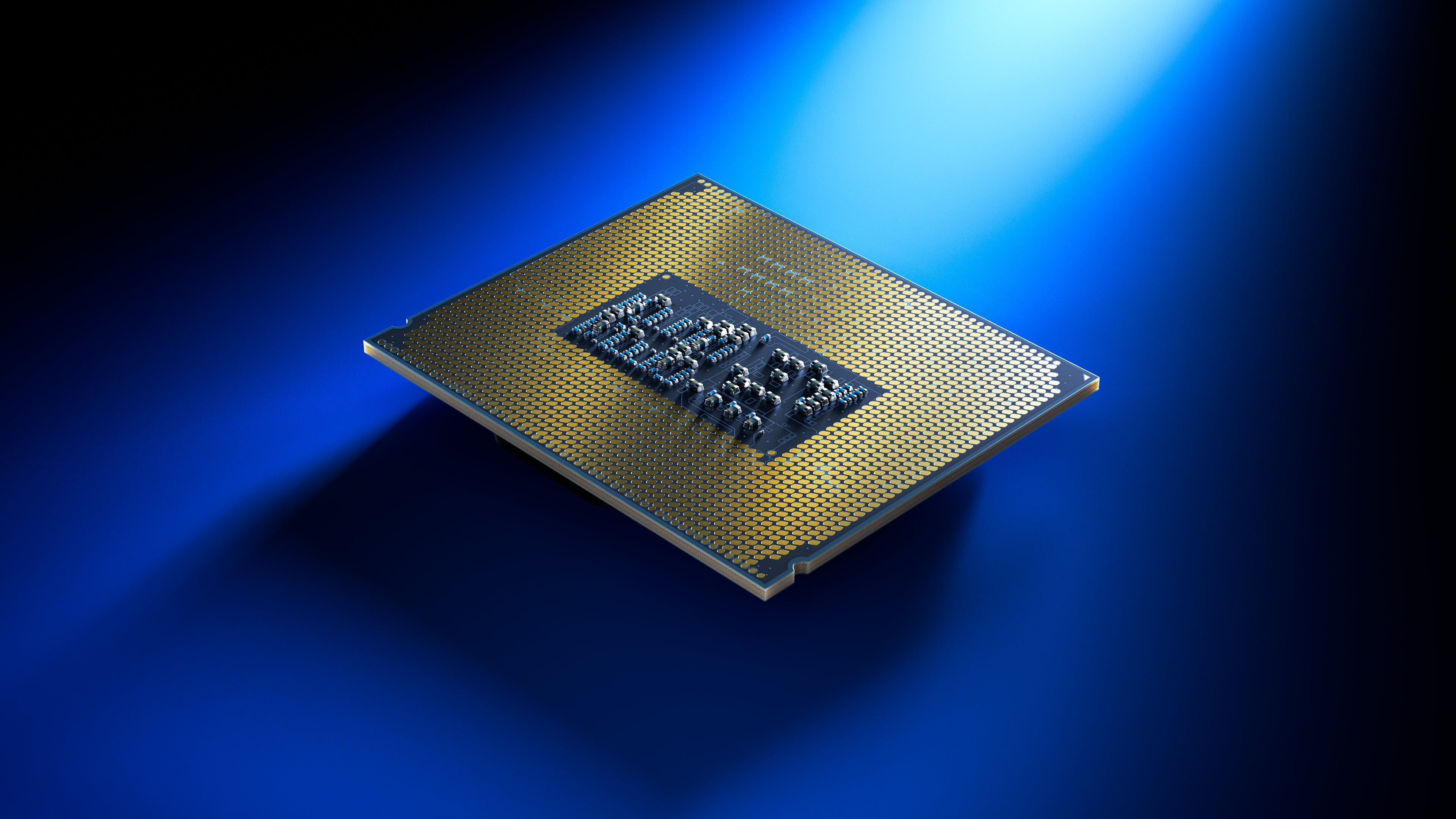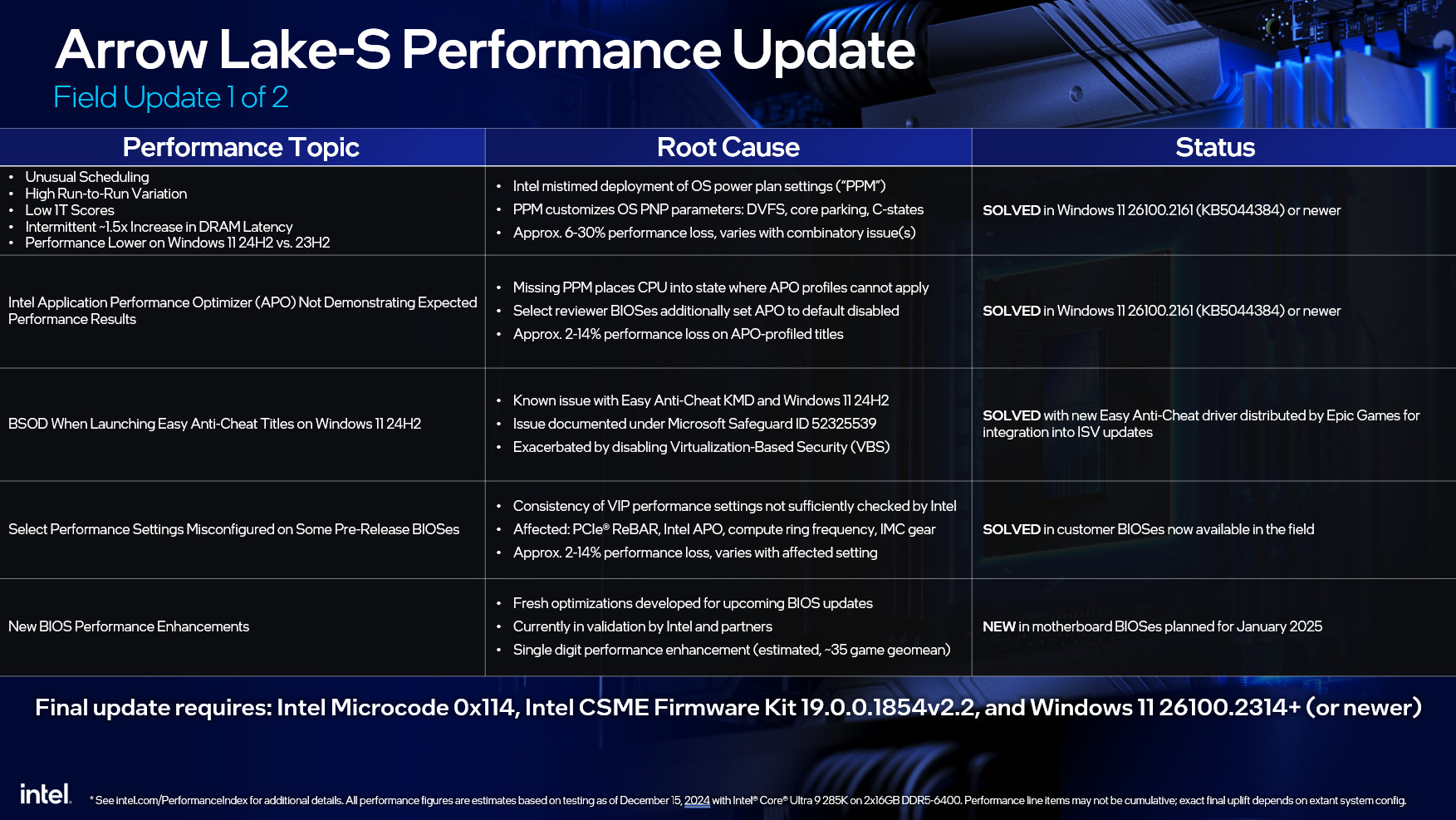Got an Intel Core Ultra 200S CPU? These are the patches you need to help gaming performance – with one more update coming in January 2025
Four out of five necessary fixes are now deployed for Arrow Lake

- Intel has issued a full and detailed report on Arrow Lake’s subpar performance
- Five separate problems were highlighted, four of which are now fixed
- You’ll need to update your BIOS and Windows 11 to get those fixes
Intel has finished its deep-dive investigation into problems with its Core Ultra 200S processors, and has presented the full results – with most of the issues now fixed, and one remaining remedy to be taken in January 2025.
As you may recall, these Arrow Lake desktop CPUs, launched in October, disappointed with their initial performance – particularly for PC games – and Intel subsequently admitted that Core Ultra 200S CPUs weren’t performing as well as expected, but that fixes were in the pipeline.
We were promised cures for a “series of multifactor issues” in fact, and now we have the full lowdown on those gremlins in the silicon works.
In a lengthy blog post, coined a ‘field update’ (part one of two), Intel observed that: “Editorial conclusions on gaming performance were more polarized, with noteworthy statistical variation from one article to the next. These results were inconsistent with our internal testing.”
Team Blue then says “we have determined that there are five distinct topics that could alter performance or functionality,” before going on to list those areas. They are as follows:
- A missing Performance & Power Management (PPM) package
- Intel Application Performance Optimizer (APO) could not take effect
- BSODs when attempting to launch game titles utilizing the Easy Anti-Cheat service
- Select performance settings misconfigured on reviewer or early enabling BIOSes
- New BIOS performance optimizations
All of these issues have been ‘root caused’ – meaning Intel has got to the bottom of why they’re happening – and the first four have been resolved by updates that are already out there.
To get the benefit of these solutions, you need to avail yourself of two main updates. Firstly, update Windows 11 to build 26100.2314 (or newer), which is the November cumulative update for the 24H2 version. (We presume that the 23H2 update for the same month will also work – but Team Blue doesn’t mention this, so that isn’t clear). This will deal with issues number one and two as listed above.
Get daily insight, inspiration and deals in your inbox
Sign up for breaking news, reviews, opinion, top tech deals, and more.
Secondly, you need to get the latest BIOS update for your motherboard, which cures problem number four. As for issue three, that’s resolved by an Easy Anti-Cheat driver update (that’ll be piped through with the game that uses this anti-cheat system, which has been problematic with Arrow Lake on Windows 11 24H2).
The final problem, number five, is the one that’ll be fixed in January 2025 with a new BIOS update, which will provide a further performance uptick.

Analysis: Initial double-digit boost, then a single-digit follow-up
As Intel notes, you might just want to wait until next month anyway, then do your BIOS update and grab the fixes for issues four and five in one fell swoop.
Whereas the exact gaming (and app) performance increase you get will depend on your exact mix of PC components and system configuration – as ever – it seems to be the case that the first BIOS update (for problem four) is going to give you at least a boost of a few percent, or perhaps a double-digit uplift (up to 14% in theory, a pretty wide range). The second patch (for problem five, coming in January) is likely to provide a “modest performance improvement in the single-digit range,” we’re told.
So, both of these BIOS updates will likely provide a similar uplift of around 5% or so, maybe a bit more, but if you get lucky – or unlucky depending on how you look at it – you’ll get an even bigger boost (because your system was more hamstrung by these issues in the first place).
We should also point out that fix number two is for Intel APO (Application Performance Optimization) tech, so only a small number of games will benefit from that (those that support APO).
Intel has been commendably transparent in this process, and in revealing the detailed results of its investigation – as the company promised it would. So, that’s a definite tick for Team Blue, and hopefully any Arrow Lake gaming sluggishness will be pretty much ironed out by the time we get to the end of January 2025.
Via VideoCardz
You might also like...
Darren is a freelancer writing news and features for TechRadar (and occasionally T3) across a broad range of computing topics including CPUs, GPUs, various other hardware, VPNs, antivirus and more. He has written about tech for the best part of three decades, and writes books in his spare time (his debut novel - 'I Know What You Did Last Supper' - was published by Hachette UK in 2013).